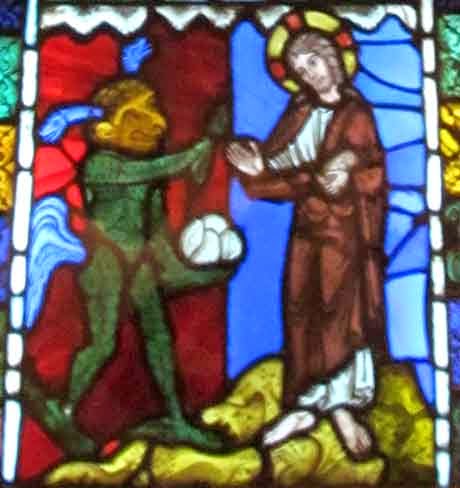 |
| A 12th Century stain glass panel from a Church in France. Might Satan be tempting Christ to read a novel involving vampires? Victoria & Albert Museum, London. |
In A Flame in Byzantium by Chelsea Quinn Yarbro, General Belisarius' enemies in Emperor Justinian's court grow so convinced of his guilt that they contact one of his household servants. After threatening him with torture and a grisly death, he agrees to spy for them. This man, who resents his lowly position in life as a servant, let alone being castrated during childhood, goes through the General's library, and reports back on the books in his collection. A treatise on military tactics used in other lands? A book on all known breeds of horses? Books on World Geography or History? Well, Belisarius has traveled extensively, and met many foreigners. Inevitably, he has read their books, and been influenced by their teaching. If those books weren't written by Byzantine citizens, then they must surely be suspect. Who knows what dangerous philosophies, undetectable to the unwary, might lurk within those pages?
At least that's the position of the Court Censor and his staff, after hearing the report from Belisarius' slave. These advisors slowly exert their influence on the Emperor, who orders Captain Drosos, instead of his general, to command an army contingent in Alexandria. This historic city is one of the foremost of Egypt, and is known the world over for its extensive libraries. Egypt is also home to Coptic Christianity, a proponent of Monophysitism. So one day Drosos receives orders from his Emperor: he must burn the libraries, to prevent the spread of heretical teachings through seemingly innocuous scholarly works on subjects like Mathematics, Science, and History. As he believes his Emperor rules by divine right, he does so. But watching all that accumulated knowledge and art going up in flame infects him like a cancer, slowly eating away at him, until all that remains is the husk of his former self.
But then, all books hold power, nonfiction and fiction alike. Reading and studying them influence people in all sorts of unforeseen ways, hopefully for the better, but sometimes for the worse. Those books might be a textbook on Math or Biology, a graphic novel, an cozy mystery, or a story about vampires.
Dragon Dave























